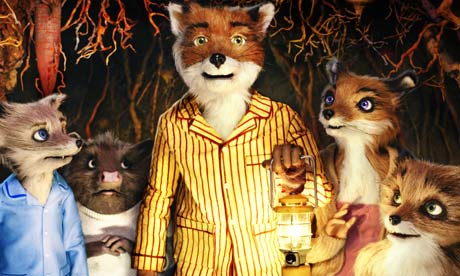
The precision, brevity and clarity of Roald Dahl's literary style probably derived from the way you learn to give orders, keep logs, write situation reports and contribute to debriefings as an officer in the armed forces. His realism, lack of sentimentality, distrust of the adult world and streak of cruelty came from experiencing childhood, the class system and public schools from an alien perspective (a boy of Norwegian parents observing British institutions), followed by Second World War service as an RAF fighter pilot and subsequent intelligence work in Washington.
Apart from an awareness of his varied audiences, there isn't a great deal of difference between Dahl's writing for adult and juvenile readers, and one of the chief challenges in adapting his stories is opening them up. He was a perfect source for Alfred Hitchcock's 25-minute TV mysteries. Indeed, one of his stories, "Man From the South", was used twice by Hitchcock, and again by Quentin Tarantino for his macabre contribution to the 1995 portmanteau film Four Rooms.
But his first work to reach the big screen, "Beware of the Dog", his classic wartime tale with a brilliant twist in the tail, was a four-page story expanded into the two-hour film 36 Hours. Equally, Fantastic Mr Fox, his 1970 children's story, provides Wes Anderson and his co-screenwriter, Noah Baumbach, with the central characters and the narrative core for their highly diverting stop-motion animation film.
Dahl's fable touches on issues of intensive agriculture and ethology, which were very much in the air at the time it appeared. The wily Mr Fox, who lives a natural life, loses his tail to the loathsome trio of exploitative agribusiness farmers, Boggis, Bunce and Bean. (The symbolic castration inevitably evokes the tail lost by Squirrel Nutkin to Old Brown the owl in the Beatrix Potter story.) The vicious trio then lay siege to Fox and his family, driving them further underground until Fox unites his threatened fellow creatures. Together, they penetrate the three farms from underground and live off the poultry, meat and vintage cider they steal while the dumb farmers sit waiting above.
In such films as The Life Aquatic With Steve Zissou, The Royal Tenenbaums, and The Darjeeling Limited, Wes Anderson has shown a fascination with sibling rivalry, eccentric matriarchs and dysfunctional families uniting against the outside world and he introduces these themes into a more complicated, and sentimentalised version of Fox's life. Like many a western gunfighter or gangster, the cool, suave Fox (voiced by George Clooney) is persuaded by his wife (Meryl Streep, Hollywood's voice of balance and maturity) to give up a life of rapine for a more settled existence. So he becomes a journalist, moves from his underground lair to live in a tree sold to him by a local estate agent, inevitably a weasel (Wes Anderson himself).
Inevitably, bourgeois conformity goes against Fox's nature and, like the super-crook Danny Ocean in the series of heist movies Clooney made with Steven Soderbergh, he recruits a dim possum for a few final raids on Boggis, Bunce and Bean, which result in the siege Dahl so admirably creates. Meanwhile, Fox's adolescent son, Ash, has to compete with his visiting cousin, Kristofferson, a karate ace and all-round athlete who can dive from a tree into a barrel of water without causing a splash. The Anglo-American or mid-Atlantic setting is amusingly sustained by having the two cousins attend the local high school where they're coached by Anderson regular Owen Wilson in "whackbat", a bizarre cross between cricket and baseball.
When the film escalates into hectic action, it draws on Hollywood genres, westerns in the Sergio Leone mode and crime movies; the treacherous Rat (Willem Dafoe) has a redemptive death scene, a parody of a classic gangster film that happily produces laughter rather than tugging at heart strings.
In a tradition that has been going on since the 1950s, when the brutal Romans in Ben-Hur were played by British actors and the gentle Jews by Americans, the animals in Mr Fox are voiced by Americans and the oppressive humans by Englishmen. Bean, the most detestable farmer, is played by Michael Gambon using his menacing gangster accent from The Cook, the Thief, his Wife & Her Lover and Layer Cake.
But if the movie is Americanised, even to the extent of Mr Fox making his entry to the "Davy Crockett" theme from the 1950s Disney TV series, a significant contribution to the film's beguilingly stylised graphic quality comes from British artists. The puppets are created by the team of MacKinnon and Saunders and the exceptional photography is the work of Tristan Oliver, who collaborated with Nick Park on most of Aardman's stop-motion pictures, including Chicken Run, a film that compares favourably with Mr Fox.
In 1967, Roald Dahl scripted the fifth Bond movie, You Only Live Twice, which opens with a disturbing comic scene of an American space capsule being swallowed in orbit by Ernst Blofeld's giant spacecraft that opens up at the front like a shark's jaws. This is a black joke about the food chain and the survival of the fittest and his Mr Fox is part of this process. Anderson adds a coda to Fantastic Mr Fox that softens and domesticates Dahl's ending. He removes Fox from his natural world red in tooth and claw and makes him an urban creature targeting supermarkets.

